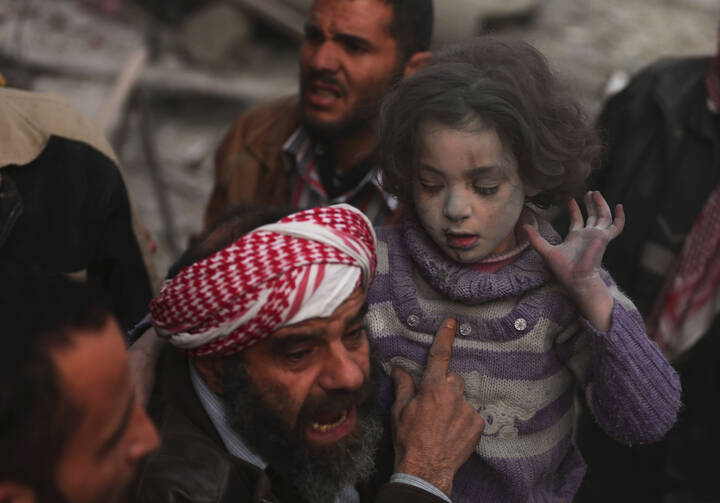For Syria, dialogue is the only way forward, said Archbishop Silvano M. Tomasi today. Tomasi is head of the Holy See delegation at the international conference on Syria in Montreux, Switzerland. “Confronted with the indescribable suffering of the Syrian people," he said, "a sense of solidarity and common responsibility prompts us to engage in a dialogue which is based on honesty, mutual trust, and concrete steps.”
“There is no military solution to the Syrian crisis,” Archbishop Tomasi said. “The Holy See is convinced that violence leads nowhere but to death, destruction and no future. … The Holy See renews its urgent appeal to all the parties concerned for the full and absolute respect for humanitarian law.”
He presented various proposals, emphasising that “an immediate cease-fire without preconditions and the end to violence of all kinds should become a priority and the urgent goal of these negotiations." He added that “all weapons should be laid down and specific steps should be taken to stop the flow of arms and arms funding that feed the escalation of violence and destruction, to leave room for the instruments of peace.”
Likewise, Archbishop Tomasi commented that the cessation of hostilities should be accompanied by “increased humanitarian assistance and the immediate start of reconstruction,” which should “start together with negotiations and should be sustained by the generous solidarity of the international community. In this process, young people should be given a preferential consideration so that through their employment and work they may become protagonists for a peaceful and creative future for their country.
“Community rebuilding calls for dialogue and reconciliation sustained by a spiritual dimension. The Holy See strongly encourages all religious faiths and communities in Syria to reach a deeper mutual knowledge, a better understanding and a restoration of trust." He continued, “It is important that regional and international powers favour the ongoing dialogue and that regional problems be addressed. Peace in Syria could become a catalyst of peace in other parts of the region, and a model of that peace that is so urgently needed."
“Beyond the tragedies of the current crisis, new opportunities and original solutions for Syria and its neighbours can come about. … [so that] no one is forced to leave his country because of intolerance and the inability to accept differences. In fact, the equality assured by common citizenship can allow the individual to express for himself and in community with others the fundamental values all persons hold indispensable to sustain their inner identity."
The archbishop concluded by emphasising that since the Syrian crisis began, the Holy See has been following its developments with deep concern and has constantly advocated that all parties involved commit themselves to the prevention of violence and to the provision of humanitarian assistance to all victims. The Holy See observer also referred to the many occasions on which the pope has raised his voice “to remind people of the futility of violence, inviting a negotiated resolution of problems, calling for a just and equitable participation of everyone in the life of society,” and highlighted the convocation by the Holy Father of a Day of Prayer and Fasting for peace in Syria and the Middle East, which received an overwhelmingly positive response worldwide. He concluded by remarking that the culture of encounter and the culture of dialogue are “the only way to peace.”








